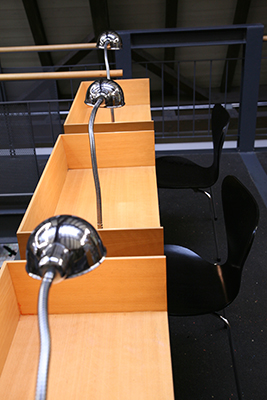 You’ve got your AU course materials. You’ve got a plan. Now if you could just teleport everyone else off your planet, you could get some studying done!
You’ve got your AU course materials. You’ve got a plan. Now if you could just teleport everyone else off your planet, you could get some studying done!
Your roommate is gabbing on the phone; your kids are fighting?again?over who started it; your spouse has decided that now is a good time to talk about household expenditures. How can you study with all these distractions?
You can’t, and That’s why It’s important to set the stage to make?and protect?space and time for your studies.
Designate space. First of all, you need room. A whole room, if possible. Having a designated study space?that is used for your studies and nothing else?is ideal. By having a dedicated space, at the end of each study session you can leave your books and papers where they are and continue on next session. If you have to share your space, get a bag, box, or bin in which to store your study materials. That will keep your stuff organized, and reduce the chance of someone else tidying up your carefully organized notes.
Designate time. Last week’s article talked about setting up a study schedule. It’s not enough for you to know the schedule?you need to keep others in the loop. By telling other household members your study plans, they’ll learn when you need quiet study time. Having a regular schedule makes it easier for everyone to remember. Post a calendar or whiteboard with your study times noted to serve as a reminder to them and motivation to you. However, realize that your studies may not be a priority to other household members and be generous?and tactful?with reminders about your study schedule.
Deal with kids on their level. If you have young kids, You’re probably going to encounter study challenges. There’s no universal strategy for dealing with kids at home while you study?teleportation is not yet an option. The simplest solution may be to plan your study time late in the evening after kiddie bedtimes, or early in the morning. If You’re not a night owl or an early bird, however, you may need more inventive strategies. Young children can’t be expected to grasp the importance of your studies. One method to make your study time meaningful for them is to arrange to have a toy, game, or activity book that can only be used while you study?those scholastic-type activity books, for example, or a video game that can be played on low volume. If they can only play the game while You’re studying, you may get more cooperation in pursuit of quiet study time.
Escape your place. If home is just too chaotic or crowded, you may need to find alternate study space. Public libraries are ideal, having seating areas, wifi, and?usually?quiet. Are there other places in your community where you could study in peace? Coffee shops, while not quiet, often offer wifi and seating space. You may need earphones to tune out the chatter from other customers. If there is a college or university nearby, check out their study areas. In some institutions, you can access these areas even if You’re not a registered student.
Escape to or from the cubicle. Sometimes the quietest study place is at work. If you work in an office, you’ll enjoy access to all the tools you need, including desk space. Be sure to get permission from your boss, though, even if you plan to study before or after work, or at breaks. A potential drawback is interruptions; if You’re at your desk, co-workers may assume you are available. If you can’t keep people from popping their head around the cubicle wall while You’re studying, try finding an empty desk or meeting room to use during your study time.
You don’t have to limit your study setting to one location. Your ideal study space one day might be the library. The next day, your mother-in-law’s place (while She’s out playing euchre with friends) and the day after that, the local coffee grind. Next week, you might house-sit at your neighbours? place while they’re on vacation. What works for one person might not work for another, but you may find other people have ideas you haven’t considered.
The ideal study setting may be a sound-proof room with a spacious desk and a comfy chair. There would be no chance of interruption or opportunity for distraction. The reality for many online students, however, is make-do space and conflicting schedules and priorities. Experiment to find out what works for you and your situation.
Have you discovered a creative study space solution that works for you? Share your idea with other AU students by e-mailing voice@voicemagazine.org.
Barbara Lehtiniemi is a writer, photographer, and AU student. She lives on a windswept rural road in Eastern Ontario

